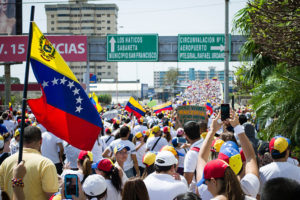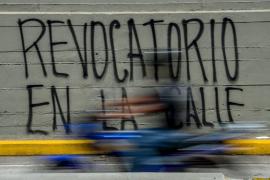
Gonzalez examines the development of Latin American political economy and impact of the COVID-19 pandemic.

Gonzalez examines the development of Latin American political economy and impact of the COVID-19 pandemic.

The troops gathering on the borders between Venezuela and Brazil and Colombia are no less threatening to Venezuela because they claim to be protecting a ‘humanitarian convoy’. And Richard Branson’s concert simply provides another cover to conceal the real purposes . . .

The troops gathering on the borders between Venezuela and Brazil and Colombia are no less threatening to Venezuela because they claim to be protecting a ‘humanitarian convoy’. And Richard Branson’s concert simply provides another cover to conceal the real purposes . . .

The Bolivarian revolution led by Hugo Chavez from 1999, opened a new chapter in the global struggle for social justice. For anti-capitalists across the world, his ‘21st century socialism’ pointed ahead to a new kind of power, defined in the Bolivarian Constitution as “participativa y protagonista” – a participatory democracy in which the people were the active subjects.
It is hard to reconcile that hope with the realities of Venezuela today. The spokespersons of the new State continue to proclaim their revolutionary credentials. Yet they oversee a society in profound and worsening crisis, where hunger has reappeared in a country which just four years ago was congratulated by the U.N. for its virtual elimination of extreme poverty. The right wing media – nationally and internationally – have taken great delight in publishing photographs of food queues marshalled and overseen by armed National Guards. The supporters of Chavismo instinctively refuse to believe the images. But the social crisis they symbolize is real.

Samuel Farber, The Politics of Che Guevara: Theory and Practice. Chicago: Haymarket Books, 2016. 192pp. $16.95
For two generations of activists, Ernesto Che Guevara has symbolized a kind of selfless heroism. His relative youth at his death in 1967 (he was 38) conserved his air of rebelliousness and the image of a man interested only in the struggle, rather than in power. Yet Sam Farber who acknowledges these qualities, describes him early in his new book, The Politics of Che Guevara, as “irremediably undemocratic”. The contradiction is striking and central to Farber’s critical analysis of Che’s life as a revolutionary.